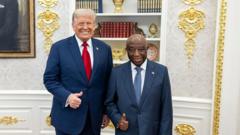The article explores the ongoing trade conflict between the U.S. and Brazil, spurred by political feuds and tariff threats.
### U.S. and Brazil Trade War Erupts Amid Political Tensions

### U.S. and Brazil Trade War Erupts Amid Political Tensions
Amid escalating political tensions, the U.S. and Brazil face the brink of a trade war with tariffs on imports and exports as President Trump retaliates against Brazil’s judicial actions against Jair Bolsonaro.
As the trade relationship between the United States and Brazil teeters on the edge of war, recent developments reveal how closely intertwined politics and economics have become in the two nations.
In a striking escalation of tensions between the Western Hemisphere's biggest economies, President Trump announced on Wednesday a plan to impose a staggering 50 percent tariff on Brazilian imports. This retaliatory measure springs from a political context rather than an economic one—since the U.S. enjoys a trade surplus with Brazil. Trump accused Brazil of orchestrating a “witch hunt” against his political ally, former President Jair Bolsonaro, who is currently embroiled in legal battles over alleged coup attempts.
In response to these threats, Brazilian President Luiz Inácio Lula da Silva vowed that his government would counter with tariffs on American imports. In his statement, Lula emphasized Brazil's status as a sovereign nation with autonomous institutions, stating that it would not accept foreign interference or "tutelage."
To mitigate potential economic fallout, Brazilian officials are reportedly considering selective tariffs on specific American products, avoiding sweeping measures that could disrupt the broader economy. A senior official, speaking anonymously, revealed that the focus would be on targeted sectors rather than a blanket tariff approach.
This conflict signals the culmination of ongoing friction surrounding Bolsonaro, Trump, and Lula, reflecting how Trump is leveraging tariffs as a weapon against his political adversaries. As both nations prepare for a tit-for-tat escalation, the consequences could unfold with sweeping impacts across trade sectors.
Here are the critical elements to consider from this unfolding situation:
- What specific targets have been identified for tariffs by both nations?
- Which products does Brazil currently export to the U.S. that could be affected?
- What is the political history connecting Trump, Bolsonaro, and Lula?
- What legal challenges confront Bolsonaro, and how might these impact future relations?
- What are the anticipated next steps as both governments navigate this escalating conflict?
As the international landscape shifts, all eyes remain on how these economic sanctions will reshape U.S.-Brazil relations in the foreseeable future.
In a striking escalation of tensions between the Western Hemisphere's biggest economies, President Trump announced on Wednesday a plan to impose a staggering 50 percent tariff on Brazilian imports. This retaliatory measure springs from a political context rather than an economic one—since the U.S. enjoys a trade surplus with Brazil. Trump accused Brazil of orchestrating a “witch hunt” against his political ally, former President Jair Bolsonaro, who is currently embroiled in legal battles over alleged coup attempts.
In response to these threats, Brazilian President Luiz Inácio Lula da Silva vowed that his government would counter with tariffs on American imports. In his statement, Lula emphasized Brazil's status as a sovereign nation with autonomous institutions, stating that it would not accept foreign interference or "tutelage."
To mitigate potential economic fallout, Brazilian officials are reportedly considering selective tariffs on specific American products, avoiding sweeping measures that could disrupt the broader economy. A senior official, speaking anonymously, revealed that the focus would be on targeted sectors rather than a blanket tariff approach.
This conflict signals the culmination of ongoing friction surrounding Bolsonaro, Trump, and Lula, reflecting how Trump is leveraging tariffs as a weapon against his political adversaries. As both nations prepare for a tit-for-tat escalation, the consequences could unfold with sweeping impacts across trade sectors.
Here are the critical elements to consider from this unfolding situation:
- What specific targets have been identified for tariffs by both nations?
- Which products does Brazil currently export to the U.S. that could be affected?
- What is the political history connecting Trump, Bolsonaro, and Lula?
- What legal challenges confront Bolsonaro, and how might these impact future relations?
- What are the anticipated next steps as both governments navigate this escalating conflict?
As the international landscape shifts, all eyes remain on how these economic sanctions will reshape U.S.-Brazil relations in the foreseeable future.





















